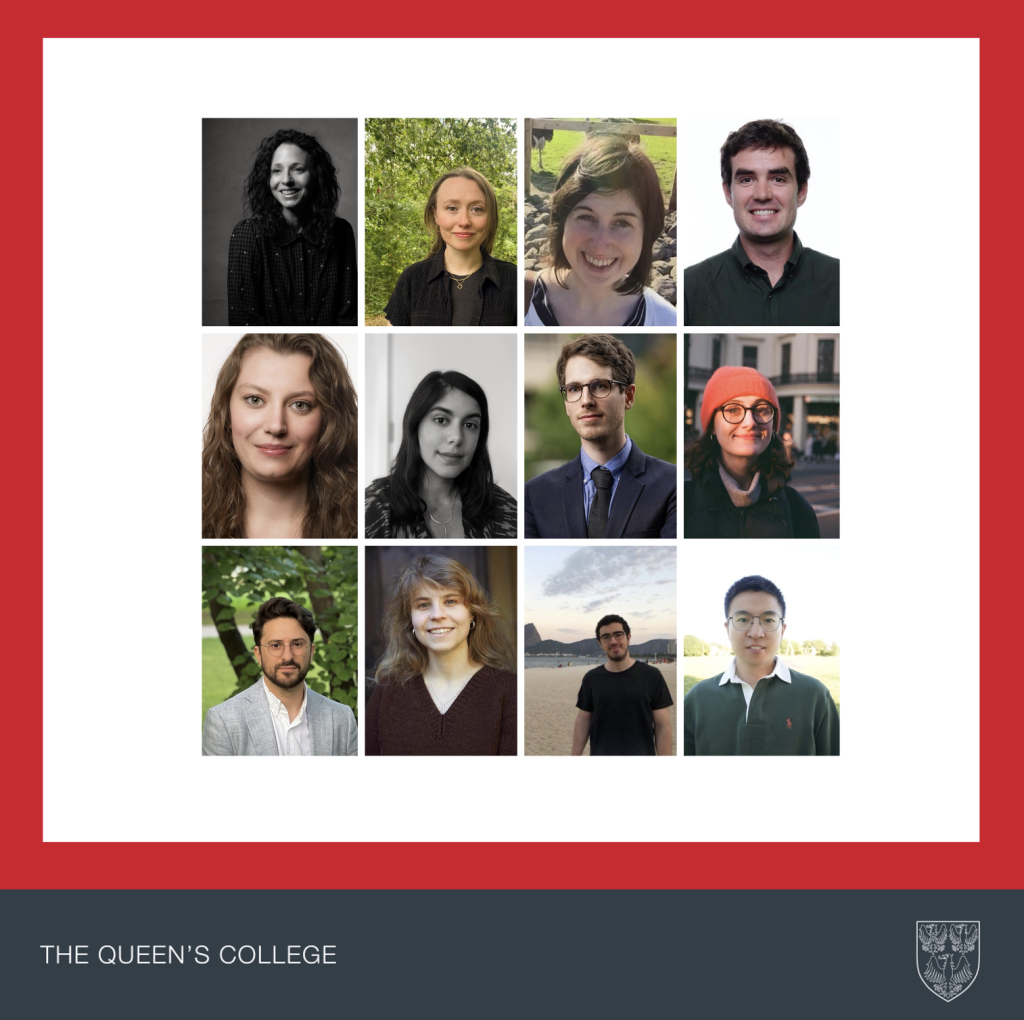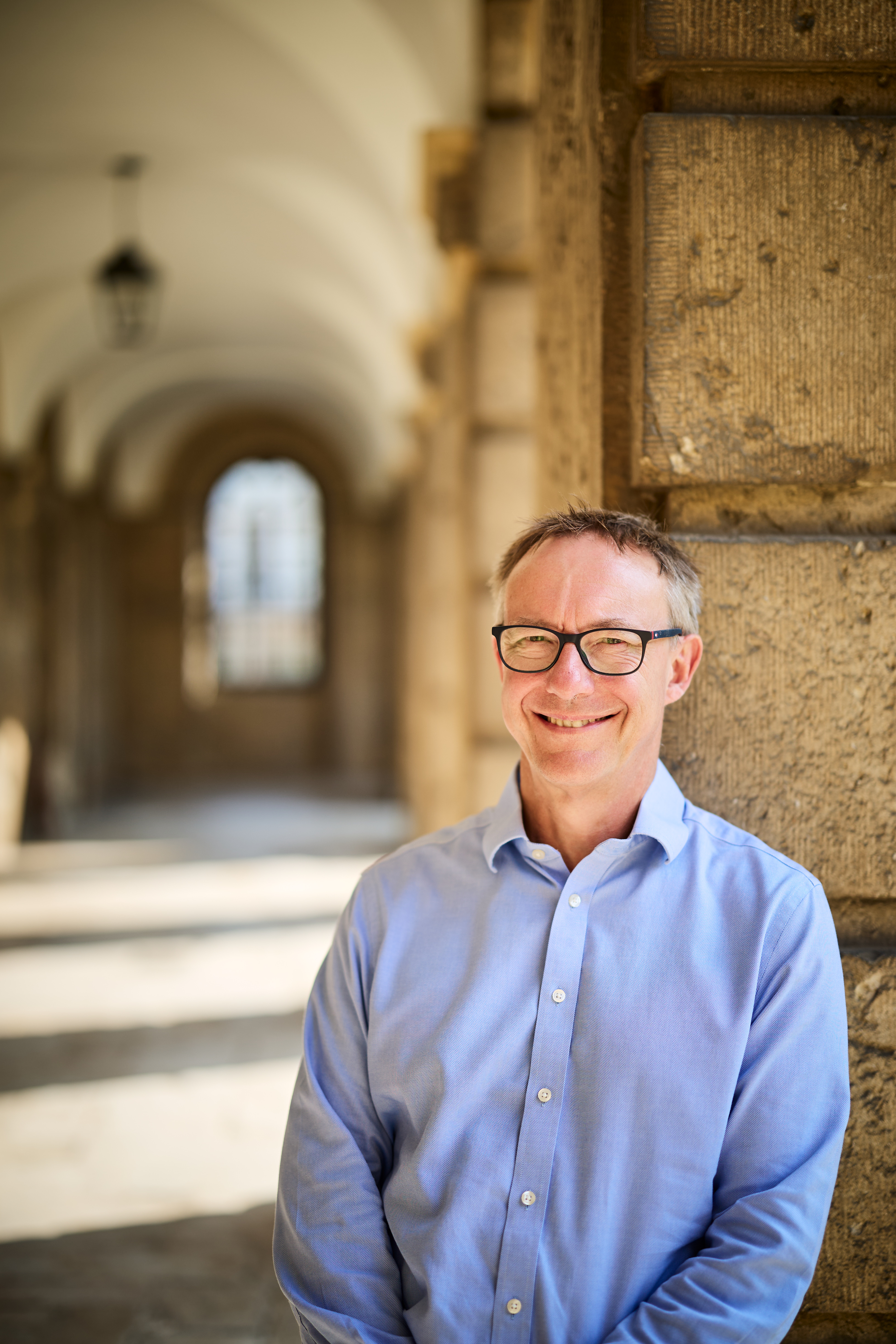At the start of each academic year, we welcome new academics to Queen’s. Please find brief biographies for our newest members below.
Tamara Atkin, Fellow in English
Tamara is a literary critic and book historian, with a focus on medieval and early modern drama and histories of premodern books. She completed her DPhil on medieval and Tudor drama at University College, Oxford before working at Queen Mary University of London, where she was also Head of English.
She has published widely on fifteenth- and sixteenth-century drama and is currently completing a monograph about the reuse and recycling of old books in early modern England. In addition, she is developing a new project, which is about the second-hand book trade in early modern England and beyond.
Aura Raulo, Browne Junior Research Fellow in Biology
Aura is a microbial ecologist studying the ecology of symbiotic gut microbiota in social animals. Their background is in island ecology and this has led them to study wild animals as if they are moving islands, carrying a mini-ecosystem of bacteria inside them. They completed their Master’s in Helsinki University studying the social group-specific microbiomes of red-bellied lemurs, after which they moved to Oxford to start a DPhil in Zoology in 2016. Here, they built on the idea of microbiomes as ecosystems nested inside social systems by developing a new study system in Wytham Woods to study how gut microbiomes spread in social networks of wild mice.
Aura will be working on a new kind of ecological theory for microbial communities nested within networks. They will be exploring questions such as how biodiversity and local uniqueness of island-like ecosystems arise as a function of both contact and isolation. They will approach these questions through mathematical simulations as well as empirical research in Wytham, studying how wild mouse microbiomes gain diversity and uniqueness while spreading in their host’s social network. The idea of influential combinations of things accumulating together in networks is remarkably generalisable to other systems as well. Inspired by this, they will also be exploring if ecological theory could be used to explain dynamics of information networks and, conversely, if information theory could be used to better understand ecosystems.
Aoife Cantrill, Laming Junior Research Fellowship in Living Foreign Languages
After studying history as an undergraduate, Aoife completed her MPhil and DPhil (2022) in Chinese Studies at Oxford with time spent at Peking University and National Taiwan University along the way. Prior to coming to Queen’s, she was a researcher at National Taiwan Central Library (2022) in Taipei and Lee Kai Hung Postdoctoral Research Associate at the Manchester China Institute (2023-24). She also worked as a Lecturer in Chinese Studies at the University of Manchester (2023-24), where she taught courses on modern Chinese literature, East Asian visual culture and Japanese imperial history.
Her research looks at the Japanese Empire and its cultural legacy in China and Taiwan. She is currently completing her first monograph, which looks at women’s writing, gendered citizenship, colonial history and translation politics in Taiwan from 1930 to the present day. She argues that the various translations and adaptations of women’s writing from the colonial period serve as sites for expressing and contesting ideas of women’s reproductive roles within Taiwanese society. These range from the expectation that women should serve the Japanese Empire by producing sons, to contemporary reclamation of these texts through feminist activism and queer literary experimentation.
Kirsty Duffy, Fellow in Physics
Kirsty Duffy is an experimental particle physicist, with a research focus on neutrino physics. Following an undergraduate degree (MPhys, Balliol College) and PhD (St Cross and Oriel College) at Oxford, she spent four years in the USA as a Lederman Fellow at Fermi National Accelerator Laboratory (the USA’s particle physics laboratory, located just outside Chicago). She returned to Oxford in 2021 as a UKRI Future Leader’s Fellow and Lecturer at Lincoln College, Oxford, before taking up the current position at Queen’s.
Kirsty will join Professor Robert Taylor in teaching the Physics course at Queen’s, where she will teach a range of topics including classical mechanics, special relativity, quantum mechanics, and nuclear and particle physics. She is a world expert in neutrino interaction and oscillation physics and made the first measurement to show an indication of differences in the oscillations of neutrinos and antineutrinos. Kirsty leads the physics strategy of the MicroBooNE Collaboration (180+ collaborators) as Physics Coordinator (2021-present) and UK Spokesperson and conducts further research on the international Short Baseline Near Detector (SBND), T2K, and the Deep Underground Neutrino Experiment (DUNE) collaborations. At Queen’s, she will continue to develop a world-leading programme of neutrino interaction and oscillation measurements, which could ultimately shed light on some of the most fundamental questions in our universe.
Zachary Goodwin, Extraordinary Junior Research Fellow in Materials
Zac completed his undergraduate, master’s and PhD degrees at Imperial College, London in the Chemistry, Physics and Materials Departments. During his time at Imperial, his research focused on developing theories for electrolytes and electronic structure calculations of magic-angle moiré graphene multilayers, amongst other areas. After which he undertook postdoctoral work at the National Graphene Institute at the University of Manchester and the Harvard John A. Paulson School of Engineering and Applied Sciences. At Queen’s, Zac will continue his research on the theory and simulation of energy materials using machine learning methods.
Diva Gujral, Extraordinary Junior Research Fellow in the History of Art
Diva Gujral is an art historian and historian specialising in the visual culture of postcolonial India. She completed her PhD, Picturing Non-Alignment: Photography, nation-building and identity in India, c. 1950-1975, at UCL in 2021. Her thesis explored modernism in Indian photography and film in the context of independent India’s Cold War-era diplomatic networks and exchanges. She was most recently a Fellow at the Department of International History at the London School of Economics and Political Science, prior to which she has held teaching positions at the Open University and at UCL.
Diva will hold her eJRF at Queen’s in concurrence with a Leverhulme Early Career Fellowship at the Ruskin School of Art. Whilst at Queen’s she will commence a new research project entitled “The Persistence of Modernism: Art, Nationalism and India’s History Wars (2014—)”. The project will examine how Indian contemporary artists, photographers and filmmakers are actively challenging official histories in India’s changing political landscape by engaging with the country’s early postcolonial archives and legacies.
Lukas Leucht, Junior Research Fellow in Economics
Lukas is an applied economist with research interests at the intersection of political economy, economic history, and organisational economics. He recently completed his PhD in Business & Public Policy at the University of California, Berkeley. His dissertation examines the political economy of historical development in the United States and Canada, with a special focus on the role of state and quasi-state organisations. Lukas previously earned a master’s degree in Economics from the Barcelona School of Economics, and undergraduate degrees in Economics and Philosophy from the University of Munich (LMU).
While at Queen’s, Lukas will pursue a research agenda that builds on the themes of his dissertation. Ongoing work includes projects on colonial trade and the rise of Britain’s fiscal state in the 17-19th centuries and on modern party organisations in Finland. He looks forward to contributing to the interdisciplinary intellectual life of the College.
Dearbhla Kelly, Extraordinary Junior Research Fellow in Pathology
Dr Kelly is an academic Nephrologist, Internist and Intensivist with a specialist interest in the intersection of kidney and brain health. She studied Medicine at University College Cork, Ireland. She has a Diploma in Stroke and Cerebrovascular Medicine with the Royal College of Physicians in Ireland RCPI, a Masters in Internal Medicine at the University of Edinburgh, an MSc in Stroke Medicine at the Danube University Krems, Austria, and an MSc in Evidence-Based Healthcare (Medical Statistics) from the University of Oxford. She completed a DPhil in Clinical Neurosciences at the University of Oxford. The subject of her thesis was the impact of chronic kidney disease on stroke risk, mechanisms and outcomes. Following her DPhil, she continued to explore the kidney-brain axis as an Atlantic Fellow at the Global Brain Health Institute at Trinity College Dublin, Ireland and was awarded an NIH StrokeNet Fellowship to gain Stroke/Neurocritical Care trial experience at the Massachusetts General Hospital and to study genetic epidemiology at the Cerebrovascular Genomics Lab in Boston.
Since August 2023, she has been a Postdoctoral Research Fellow at the Wolfson Centre for the Prevention of Stroke and Dementia at the Nuffield Department of Clinical Neurosciences at the University of Oxford. She is funded by the Guarantors of Brain and by the Alzheimer’s Association. She is also working clinically in the Intensive Care Units (ICU) at the John Radcliffe Hospital. In her research, she is using a transcranial doppler (a type of ultrasound) to investigate the impact of dialysis therapy on brain blood flow in critically ill patients in the ICU. Her other areas of active research include the impact of acute kidney injury on the risk of delirium and post-ICU cognitive disorders, the risk and mechanisms of stroke in patients with pre-eclampsia, sex differences in stroke epidemiology, and the global capacity for the management of kidney failure. She is also one of the authors of the recently published 11th edition of the Oxford Handbook of Clinical Medicine.
Shaahin Pishbin, Laming Junior Research Fellow
Prior to his arrival at Queen’s, Shaahin was a PhD student in the Department of Middle Eastern Studies at the University of Chicago. His research focuses on Persian literature and Islamicate cultural history, and his dissertation explores the poetics of wonder and place as theorised and practiced by medieval and early modern Persian poets between Iran and South Asia. He has taught classes on Persian language, literature, and Islamic thought and history, and was a Junior Fellow at the Martin Marty Center for the Public Understanding of Religion. His work on modern and classical Persian literature has appeared, or is forthcoming, in journals including Iran Namag, The Journal of Persianate Studies, and Delos: A Journal of Translation and World Literature, as well as in volumes edited by the Cambridge University Press.
As a Laming Junior Research Fellow at Queen’s, Shaahin will work towards the completion of his first monograph, which is tentatively titled: Perceptions of Wonder: Persian Poetry between Iran and India. Bringing the history of emotions to the study of Persian literature, the book will establish how feelings of wonder and astonishment were crucial to the ways in which premodern Persian speakers perceived the world, language, and creativity. During the first year of his Fellowship, he will be conducting archival work in manuscript libraries in Iran and India, where he hopes to determine the role of commentaries in creating multilingual communities of feeling and shared reading practices across vast distances. He will also be developing shorter research projects on multilingualism in Persianate verse and Persian nonsense poetry during his time at Queen’s.
Alexandra Pugh, Hamilton Junior Research Fellowship in French
Alexandra completed her PhD in the Department of Languages, Literatures and Cultures at King’s College London, with AHRC funding from the London Arts & Humanities Partnership. With a focus on the contemporary French writer and filmmaker Virginie Despentes, her thesis examined the relationship between feminist and queer, and politics and art, in the 21st century. She has an MSt in Women’s Studies and a BA in History and Modern Languages (French) from the University of Oxford.
While at Queen’s, Alexandra will undertake a new project on the representation of abortion in French literature and film since the year 2000. This project examines how abortion is put into, and regulated through, narrative, and interrogates the relationship between abortion rights and French national identity.
Daniel Crisostomo Wainstock, Career Development Fellowship in Economics
Daniel completed his undergraduate studies with honours in Economics at Stanford University in 2019 and recently earned his PhD in Economics from Brown University in 2024. His research spans cultural economics, diversity, and inequality. At Queen’s, he will continue to advance his research in these areas, focusing on how cultural and historical factors shape modern economic outcomes. In addition to his research, he will be teaching economics.
Junqing Xie, Extraordinary Junior Research Fellow in Clinical Sciences
Junqing graduated with a DPhil from Queen’s and is currently a post-doctoral researcher with the Nuffield Department of Orthopaedics, Rheumatology and Musculoskeletal Sciences at Oxford. He has worked extensively with interdisciplinary teams to generate trustworthy evidence for clinical and regulatory decision-making, using big data and innovative methods.
His current study focus is on population-based pharmacogenomics, which explores how to leverage the whole human genome to optimise drug efficacy and minimise adverse risk for patients. He hopes to forge strong connections with brilliant experts, promising young scholars, and enthusiastic students at Queen’s to advance this exciting field of medical research.
Pictured from left to right are: (top row) Tamara Atkin, Aoife Cantrill, Dearbhla Kelly, Zac Goodwin; (middle row) Kirsty Duffy, Diva Gujral, Lukas Leucht, Ally Pugh; (bottom row) Shaahin Pishbin, Aura Raulo, Daniel Wainstock, Junqing Xie.



